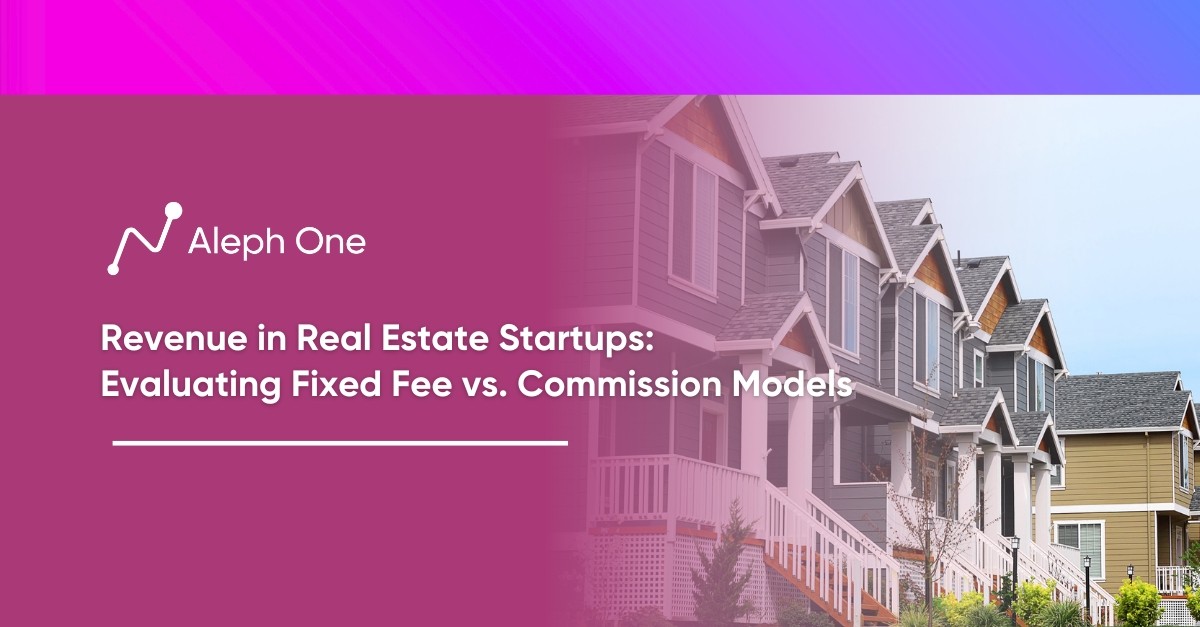Let’s work together to build something amazing. Share your project details and our team will reply to figure out the next steps to your success.

The real estate industry, characterized by an antiquated brokerage model and a lack of transparency, is ripe for innovation. Startups are emerging to revolutionize home buying and selling, challenging traditional practices and introducing customer-centric business models. With global funding for real estate tech startups surpassing $12 billion in 2018, significant potential for change is evident. In this article, we explore the challenges of the traditional commission-based model, the rise of fixed-fee alternatives, the possibility of hybrid models, the need for policy changes, and the transformative power of startups in shaping the future of the real estate industry. The time for change has come, and startups are leading toward a more efficient, transparent, and consumer-driven real estate landscape.

The Real Estate Industry is Ripe for Disruption
The real estate industry has remained essentially unchanged for decades. The traditional brokerage model, based on agents earning a percentage-based commission on each transaction, has persisted since the 1950s. However, this outdated model is ripe for disruption from innovative startups.
Real Estate Tech
New real estate tech companies are poised to revolutionize home buying and selling. These startups are developing new business models that prioritize the customer experience, streamline inefficiencies, and incorporate the latest technologies.
The Inefficiencies of Traditional Real Estate Buying
Consumers desperately need more transparency and choice in real estate. The industry is known for high fees, conflicts of interest, and a lengthy process that takes months. The traditional way of buying and selling homes is complicated, time-consuming, and can cost tens of thousands of dollars in commissions and fees. The real estate industry must catch up in an era where consumers can instantly access reviews and ratings for any product or service.
Companies Pioneering New Real Estate Tech Models
Companies like Redfin, Opendoor, and Compass are pioneering new models like flat-fee listings, buying platforms, and tech-enabled brokerages. These startups aim to streamline real estate transactions, reduce excessive fees, and provide a better overall experience for home buyers and sellers.
While the $31 trillion residential real estate market has slowly changed, new startups are poised to shake up the industry. By leveraging technology and developing new business models to serve customers better, these startups could gain significant market share from traditional brokerages that have long dominated the space. The future of real estate is wide open as startups revolutionize the home buying and selling process.
Flat Fees: An Elegant Solution to a Complex Problem
The traditional commission-based model for real estate transactions is complicated, convoluted, and rife with conflicts of interest. A more straightforward solution is emerging that could revolutionize the industry: fixed fees.
What is a Fixed Fee Model?
Several real estate startups have pioneered a fixed-fee model, charging clients a single upfront price for their services rather than a percentage of the sale price. For example, Flyhomes charges $2,500 to help clients buy a home and $3,500 to sell a home. The fixed fees cover the full range of services, including accompanying clients to viewings, handling negotiations and paperwork, and finalizing the closing.
Clarity and Transparency for Consumers
The fixed-fee model provides clarity and transparency for consumers. They know precisely what services they will receive and how much they will pay, with no hidden fees or surprise costs that often come with traditional brokerages. The model also eliminates the misaligned incentives of commissions, where agents are motivated to maximize sales price rather than serve the client’s best interests. With fixed fees, the agent’s goal is simply to facilitate a transaction that meets the client’s needs.
Hybrid Model – Fixed Fees and Traditional Commissions
Some startups are also pioneering a hybrid model, offering clients a choice between fixed fees or traditional commissions. For example, Redfin allows sellers to choose between a 1% listing fee or a fixed fee of $3,500 to $30,000, depending on the market and services. This flexible approach caters to clients with different needs and priorities. Those focused on affordability and transparency prefer the fixed fee, while those wanting to incentivize the agent to get the highest price possible may choose the commission option.
Fixed fees and hybrid models are poised to disrupt the residential real estate industry. They provide a simpler, more affordable alternative to the traditional brokerage model. For startups, they represent an opportunity to gain market share by appealing to clients frustrated with the high fees and poor service associated with most traditional brokerages.
Commissions Drive the Wrong Behaviors
The traditional commission model, where agents earn a percentage of the final sales price, encourages behaviors that often contradict clients’ best interests. Agents are motivated to maximize sales price rather than meet the needs and priorities of the customer. This can lead agents to pressure clients into making poor financial decisions to close a deal.
Conflicting Interest with the Commissions Model
Commissions also promote a need for more transparency in the real estate industry. Agents must disclose the total commission upfront, and clients remain in the dark about how much agents earn from each transaction. This information makes it difficult for consumers to determine whether they are getting fair value for their fees.
How do Agents Benefit From a Commission-Based System?
In a commission-based system, agents’ financial incentives are misaligned with their clients. The higher the sales price, the more agents earn in commissions – even if clients pay more than a property is worth. Agents should be motivated to help clients find or sell a home at the best overall price, not just the highest price.
Commission-based Model is Outdated
Historically, the percentage-based commission model made sense when real estate transactions were complex and required a high level of agent expertise. But in today’s world of readily available property information and online tools, clients are taking on more of the work themselves. A flat fee or hourly billing model better aligns with the actual value agents provide.
Comparing Fixed Fees and Commission Based Real Estate
Some argue that commissions motivate agents to work harder for their clients. But in reality, there is little evidence that commissions lead to better outcomes or higher customer satisfaction. Fixed fees can also incentivize agents to be efficient and responsive to earn repeat and referral business.
The real estate industry’s reliance on an old commission model results in misaligned incentives, lack of transparency, and mistrust. Innovative new models with flat fees or hourly billing can better align agents’ interests with their clients. As more real estate startups offer these consumer-friendly alternatives, the traditional percentage-based commission system may spell the end.
A Hybrid Model May Prevail
Some real estate startups are finding success with a hybrid model that blends fixed fees and commissions. These hybrid approaches aim to provide customers with more choice and flexibility.
For example, a startup could charge a small upfront fee to list a home and take a small commission on the final sale price. The fixed fee provides revenue stability for the company and ensures agents are motivated to provide a high level of service regardless of a home’s asking price. However, the commission still incentivizes agents to get the best price for the seller. For some sellers, paying a more significant fixed fee upfront for a lower back-end commission could also be appealing.
The Benefits of a Hybrid Model
A hybrid model also allows startups to differentiate themselves by offering a menu of options. Customers could choose a higher fixed-fee, lower-commission option if they prefer more transparent pricing and less sales pressure. Someone else may opt for a lower fixed-fee, higher-commission model if they want to maximize the final sale price of their home. Offering flexible options and the ability to choose what works best for their needs is valuable to today’s consumers.
The Risks of a Hybrid Model
While a hybrid model provides more choice, it also introduces additional complexity. Educating customers on the pros and cons of different options and managing a more complicated pricing structure requires significant resources. There is also a risk of customers feeling confused or overwhelmed by too many choices. Startups need to clearly articulate the benefits of each option and provide guidance to help customers select an approach well-suited to their priorities.
A thoughtful implementation of a hybrid model that blends fixed and variable fees could be a “best of both worlds” solution. It has the potential to drive innovation that reduces friction for the consumer while still incentivizing agents to maximize value.
Policy Changes Needed to Spur Innovation
Current state real estate policies and regulations protect the traditional brokerage model and stifle innovation. Rules like the minimum service requirements mandate that brokerages provide minimum services, even if some consumers want more tailored or affordable options. Anti-rebate laws also prohibit agents and brokerages from offering cash back or other incentives to home buyers and sellers, limiting new business models. These outdated regulations reduce competition and consumer choice. By removing barriers to entry, policymakers could make way for new startups to flourish and give more power to property owners and home buyers. Several states have already taken steps to relax regulations, with promising results.
Case Study – Eliminating Minimum Service Requirements in Colorado
Colorado eliminated its minimum service requirements in 2008. It opened the door for new business models, like flat-fee MLS listing services and cash-back rebates for home buyers. Research shows Colorado’s policy change gave consumers more options and the flexibility to choose services a la carte. Several states have followed suit.
Anti Rebate Rules – Oregon Case Study
Some states have also loosened or eliminated anti-rebate rules. When Oregon removed its anti-rebate law, new brokerages began offering cash incentives for home buyers and sellers. Not only did this save consumers thousands of dollars, but the added competition drove down industry-wide commission rates.
Setbacks from Industry Groups
However, in many states, policy changes have stalled in the face of opposition from established industry groups seeking to maintain the status quo. But with the rise of new technology-enabled real estate startups, policymakers should recognize that more flexible regulations would benefit consumers and brokers alike by spurring greater innovation.
Policymakers can keep pace with innovations transforming how people buy and sell homes by loosening regulations like minimum service requirements and anti-rebate rules. The future of real estate depends on a fair, competitive environment where startups and incumbents alike can thrive.
A Brave New World: How Startups are Transforming the Real Estate Industry
The real estate industry is on the cusp of a transformation driven by innovative startups. New companies are pioneering alternative business models that give consumers more choice and control in home buying and selling.
Fixed-Fee and Hybrid Brokerages
Fixed-fee and hybrid brokerages simplify real estate transactions while reducing conflicts of interest inherent in the traditional commission model. By charging flat fees or salaries instead of percentages, these startups can focus on meeting customer needs rather than maximizing sales prices. With lower costs and less incentive to upsell clients, fixed-fee brokerages can pass on substantial savings.
Tech-enabled Brokerages
Tech-enabled brokerages also use data and algorithms to streamline the process for both agents and clients. With interactive tools, home buyers and sellers can do much of the work themselves online, only calling on agents when expert advice and human judgment are most needed. Automating aspects of marketing, paperwork, and transactions can reduce busywork for agents, allowing them to spend more time providing value to customers.
New Models for Real Estate Startups
The startups pioneering new models are poised to gain significant market share, especially among younger, tech-savvy consumers. However, transitioning the industry from the entrenched commission model will take time. Policy changes are still needed to reduce anti-competitive barriers that protect the status quo.
The future of real estate is bright. In the years to come, consumers will have more choices in buying and selling homes. Fixed fees, hybrid models, and technology will simplify and streamline the process. Incumbent brokerages will face pressure to adapt by offering greater transparency, flexibility, and value.
Get the latest news and updates from Aleph One in your inbox.



